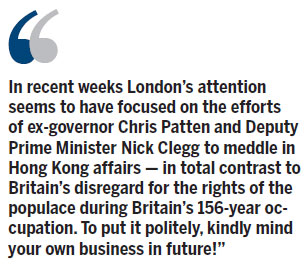London, are you listening? Mind your own business!
Updated: 2014-09-15 06:32
By Harry Ong(HK Edition)
|
|||||||
What is it about Hong Kong that brings out the very worst in the nature of the British - and has done so for almost two centuries?
In the 1830s imperial China was content to maintain its traditional lifestyle while permitting British traders in Guangzhou to buy increasing amounts of tea.
Soon problems arose because they had to pay for the tea in silver dollars, thereby severely reducing Britain's financial reserves. Its leaders' totally unconscionable solution was to flood China with opium so that London not only got back all of its silver but much of China's reserves, too.
Doing such tremendous harm to an innocent civilization should have grossly shamed this supposedly Christian country, but it was just the beginning of Britain's depredations against China. British interlopers spirited away quantities of Chinese tea plants, transplanting them in India and Ceylon (Sri Lanka), thereby deeply harming China's international tea trade.
In 1839 the British traders at Guangzhou surrendered more than 20,000 chests of opium to imperial commissioner Lin Zexu, who had it destroyed in lime pits down the coast at Humen. That same year Lin also wrote a remarkable letter of advice to Queen Victoria translated into English and pleading for Britain to stop its traders selling opium in China.

Its main points were that "bad British people are smuggling opium into China, seducing the people and spreading the poison across the country."
Pointing out that opium smoking was forbidden in England, Lin said "this means you are aware of how harmful it is. But better than to forbid smoking of it would be to forbid the sale of it, and better yet to forbid the production of it, which is the only way of cleansing the contamination at its source (otherwise you will show yourselves) careful of your own lives but careless of the lives of other people, indifferent in your greed for gain for the harm you do to others... Your Majesty must immediately search out and throw this poison to the bottom of the sea, and never again allow it to exist."
It was never confirmed that the Queen received the letter. She was then only 20 and depended heavily on the advice of then prime minister Lord Palmerston, who had already decided to launch what became the First Opium War (1839-42). Copies of Lin's letter were also sent to leading British figures plus one to the editor of The Times, who printed it in full, re-stoking a national controversy over the vile trade.
In January 1841, a rapacious Britain made its first territorial grab in China, seizing the island of Hong Kong - a grab "legitimized" a year later by an unequal treaty ending the First Opium War. Then followed China's "century of shame", when a cabal of unprincipled Western countries, plus Japan, heaped every possible humiliation on China and its people, not simply demanding unimpeded access to the busiest ports but "additional concessions" of land where these interlopers and their families could settle.
As a result, in the next 60 years up to 1902 China was compelled to grant Treaty Port status to 47 of its best ports, no fewer than 25 of which were extorted by Britain under more unequal treaties. Hardly had these ruthless interlopers got a foothold in these ports than they demanded land "concessions" where they could establish residential settlements, the largest of which was the International Settlement in Shanghai. Altogether 39 such land "concessions" or leases were squeezed out of China.
By 1906 the Treaty Ports were inhabited by a total of 6.9 million Chinese every one of whom was treated as a "native" with few rights by the combined foreign population of 38,597. Thus were the Chinese denied all but the most basic rights in their own territory.
You would think that following the return of Hong Kong in 1997 Britain would have gracefully accepted the political reality of the situation, and busied itself with such pressing domestic issues as the referendum on whether Scotland should gain its independence. But in recent weeks London's attention seems to have focused on the efforts of ex-governor Chris Patten and Deputy Prime Minister Nick Clegg to meddle in Hong Kong affairs - in total contrast to Britain's disregard for the rights of the populace during Britain's 156-year occupation. To put it politely, kindly mind your own business in future!
An interesting footnote to this story of the ruthlessness of British interlopers in China is that in 1861 Captain Dunne of the 99th Regiment presented the dog-loving Queen Victoria with the first Pekingese dog ever seen in Britain.
Apparently, informed that it had been looted from the imperial concubines' quarters at the Yuan Ming Yuan (Old Summer Palace) in Beijing during the last throes of the Second Opium War (1856-60), she unashamedly named it "Looty".
The author is a seasoned observer of Asian affairs.
(HK Edition 09/15/2014 page9)